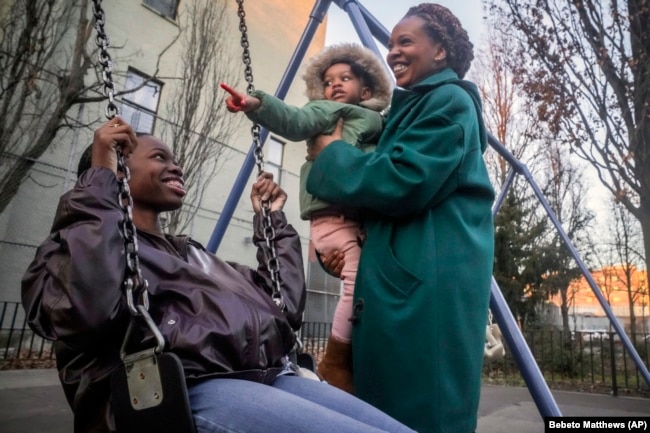AUDIO
Schools Want More Therapy for Students, Not All Parents Agree

Derry Oliver was in fifth grade when she first talked to her mother about seeing a therapist.
They were moving to New York City. Derry had to live with family members in another state while her mother, also named Derry Oliver, found a job and apartment. (In this story, we will call the daughter by her first name, Derry, and her mother by her family name, Oliver.)
It was a difficult year. A school worker suggested therapy. Derry’s mother questioned the advice and disagreed with therapy.
“You’re so young. There’s nothing wrong with you. These are growing pains,” Oliver told her daughter.
However, Derry’s depression got worse during the COVID-19 pandemic. She struggled with the loneliness of at-home learning. She reached out to her high school for help.
In New York, school-based mental health professionals like social workers can provide some counseling without parental permission. But therapy requires a parent’s agreement.
“It was very emotional for both of us because I understood her frustrations and fears,” Derry remembered. “But at the same time, it’s sometimes best for your child to be able to access this rather than hold it away from them.”
Difficulties in getting therapy
Using federal money from the pandemic, schools around the U.S. have employed more mental health specialists. They also add telehealth and online counseling to reach as many students as possible.
As treatments have become more readily available and more young people talk openly about mental health issues, schools are now facing difficulties in getting parents to agree to treatment.
Chelsea Trout is studying social work at New York University and is doing her training at a school in Brooklyn. She called it a “disconnect” between parents and children.
“The kids are all on TikTok or the internet and understand therapy-speak and that this is something that could be helpful for their mental health and are interested in…,” said Trout. But she added that they may not have support from their parents.
Politics can also play a part. Some states are looking to make getting therapy without parental permission easier while others are proposing more restrictions.
The states of California and Colorado have recently lowered the age of consent for treatment to 12. But in some states like North Carolina, the issue is part of larger political debates on the input parents can have on school teachings as well as the rights of transgender students.
Cost is another issue. Therapy is rarely free. And paying for it often requires parental support.
Parental support
Research suggests that the need for parental permission can keep young people from getting treatment.
Jessica Chock-Goldman is a social worker at Bard Early College High School in New York City. She said that she has seen many cases where mental health issues turn severe partly because young people did not get earlier access to therapy.

Derry Oliver, right, holds daughter Dessie, 2, while her other daughter, also named Derry, swings, Feb. 9, 2024, in New York. (AP Photo/Bebeto Matthews)
For Derry and her mother, years of talking have led to some progress. Several years ago, her mother agreed to a compromise.
They found a Black female therapist, which was important to both of them as a Black family. Oliver agreed that her daughter could start therapy — as long as she could sit in on the meetings.
“It has to be someone trustworthy,” Oliver said of a possible therapist for her daughter. But the therapist changed jobs after a month and Derry has not seen another therapist since.
Trout, the school social worker in training, said she has met many parents who, like Oliver, have trust issues.
“If we’re thinking about predominantly Black and brown communities, if your interactions with social workers or mental health services or anything in that realm thus far have not been positive,” Trout said, “how could you trust them with your kids?”
Racial divide
Statistics also show a racial divide.
In 2021, 14 percent of white children reported seeing a therapist at some point during that year. This number is compared to 9 percent of Black children, 8 percent of Hispanic children, and 3 percent of Asian American children. These numbers come from the Centers for Disease Control and Prevention.
Without access to therapy, Derry has sought advice about dealing with her emotions through friends, school social workers, and the Internet. But she feels that she could gain more with professional help.
Derry has already gotten into several colleges. One thing she is considering is what the school offers for therapy.
Words in This Story
grade – n. a level of study in an elementary, middle, or secondary school that is completed by a student during one year
therapist – n. a person trained in methods of treatment other than the use of drugs or surgery
apartment – n. a room or set of rooms used as a dwelling
growing pains – n. emotional difficulties or confusion experienced by a young person during the time between being a child and an adult
counseling – n. professional guidance of the individual by utilizing psychological methods especially in collecting case history data, using various techniques of the personal interview, and testing interests and aptitudes
frustration – n. a deep chronic sense or state of insecurity and dissatisfaction arising from unresolved problems or unfulfilled needs
access – n. freedom or ability to obtain or make use of something
transgender – adj. of, relating to, or being a person whose gender identity is opposite the sex the person was identified as having at birth
predominantly – adv. for the most part
realm – n. field of influence or activity
positive – adj. marked by or indicating acceptance, approval, or affirmation
https://learningenglish.voanews.com/a/schools-want-more-therapy-for-students-not-all-parents-agree/7503166.html